23 may 2019
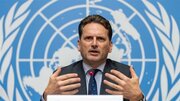
UNRWA's Commissioner General Pierre Krahenbuhl
The head of the United Nations Relief and Works Agency for Palestine Refugees (UNRWA) has rejected a US call to dismantle the agency, saying it cannot be blamed for the stalemate in the so-called peace efforts.
“I unreservedly reject the accompanying narrative that suggests that somehow UNRWA is to blame for the continuation of the refugee-hood of Palestine refugees, of their growing numbers and their growing needs,” UNRWA's Commissioner General Pierre Krahenbuhl said in a press conference in the Gaza City on Thursday.
His comments were in response to a question about what Jason Greenblatt, US President Donald Trump’s special representative for international negotiations, provocatively had said a day earlier, claiming that the agency had run its course and was no longer needed.
Addressing the UN Security Council on Wednesday, Greenblatt claimed that UNRWA had been a “bandaid” and that it was time to hand over services assured by the refugee agency to those countries hosting the Palestinian Arab refugees.
“The UNRWA model has failed the Palestinian people,” he added.
UNRWA was originally set up in 1949 to take care of hundreds of thousands of Palestinians displaced by the 1948 Arab-Israeli war in the Middle East mainly through providing them with humanitarian aid.
It was initially established as a temporary agency, but it has continued to provide support for Palestinian refugees for the better part of six decades.
It currently supports more than five million Palestinians in the besieged Gaza Strip, the occupied West Bank, Jordan, Syria and Lebanon, providing them with healthcare, education and social services with funding from international donors.
Most are descendants of the roughly 700,000 Palestinians who were driven out of their homes or fled the 1948 war that led to Israel's creation.
Last year, however, Washington cut its roughly $300 million annual donation to the UN agency, claiming that it was flawed as Trump’s administration pressed ahead with work on its so-called peace plan.
The US has accused UNRWA of expanding the definition of the refugee so that it includes all descendants of refugees regardless of whether they have taken citizenship in another country.
“The fact that UNRWA still exists today is an illustration of the failure of the parties and the international community to resolve the issue politically -- and one cannot deflect the attention onto a humanitarian organization,” the UNRWA head further said on Thursday.
The UN agency will host a conference on June 25 at which international donors are expected to pledge financial support.
The developments come as the White House is set to hold an economic summit in Bahrain’s capital, Manama, on June 25 and 26 during which the first part of Trump’s “peace plan” which is spearheaded by his son-in-law Jared Kushner will be unveiled.
The Trump administration has said that its secret plan would require compromise by both sides.
The plan has been dismissed by Palestinian authorities even before being unveiled. Palestine’s Minister of Social Development Ahmed Majdalani also said early this week that Palestinians would not participate in the economic conference in Manama.
Relations between the Palestinian Authority and the US took an unprecedented dip in late 2017, when Washington recognized Jerusalem al-Quds as Israel’s “capital.”
Since then, Palestinians have shown little interest in discussing a plan that they anticipate will fall far short of their core demands.
The Palestinian Authority, led by President Mahmoud Abbas, is facing steep aid cuts. Since being shunned by Palestinians, the White House has slashed hundreds of millions of dollars to humanitarian organizations.
Palestinians want the West Bank as part of a future independent state with East Jerusalem al-Quds as its capital, but Israel insists on maintaining the occupation of Palestinian territories.
Trump has time and again called his plan as “the deal of the century,” which is coincidentally the title of a 1983 comedy featuring a bunch of hapless arms dealers who compete to sell a weapon, called the Peacemaker, to a South American dictator.
The head of the United Nations Relief and Works Agency for Palestine Refugees (UNRWA) has rejected a US call to dismantle the agency, saying it cannot be blamed for the stalemate in the so-called peace efforts.
“I unreservedly reject the accompanying narrative that suggests that somehow UNRWA is to blame for the continuation of the refugee-hood of Palestine refugees, of their growing numbers and their growing needs,” UNRWA's Commissioner General Pierre Krahenbuhl said in a press conference in the Gaza City on Thursday.
His comments were in response to a question about what Jason Greenblatt, US President Donald Trump’s special representative for international negotiations, provocatively had said a day earlier, claiming that the agency had run its course and was no longer needed.
Addressing the UN Security Council on Wednesday, Greenblatt claimed that UNRWA had been a “bandaid” and that it was time to hand over services assured by the refugee agency to those countries hosting the Palestinian Arab refugees.
“The UNRWA model has failed the Palestinian people,” he added.
UNRWA was originally set up in 1949 to take care of hundreds of thousands of Palestinians displaced by the 1948 Arab-Israeli war in the Middle East mainly through providing them with humanitarian aid.
It was initially established as a temporary agency, but it has continued to provide support for Palestinian refugees for the better part of six decades.
It currently supports more than five million Palestinians in the besieged Gaza Strip, the occupied West Bank, Jordan, Syria and Lebanon, providing them with healthcare, education and social services with funding from international donors.
Most are descendants of the roughly 700,000 Palestinians who were driven out of their homes or fled the 1948 war that led to Israel's creation.
Last year, however, Washington cut its roughly $300 million annual donation to the UN agency, claiming that it was flawed as Trump’s administration pressed ahead with work on its so-called peace plan.
The US has accused UNRWA of expanding the definition of the refugee so that it includes all descendants of refugees regardless of whether they have taken citizenship in another country.
“The fact that UNRWA still exists today is an illustration of the failure of the parties and the international community to resolve the issue politically -- and one cannot deflect the attention onto a humanitarian organization,” the UNRWA head further said on Thursday.
The UN agency will host a conference on June 25 at which international donors are expected to pledge financial support.
The developments come as the White House is set to hold an economic summit in Bahrain’s capital, Manama, on June 25 and 26 during which the first part of Trump’s “peace plan” which is spearheaded by his son-in-law Jared Kushner will be unveiled.
The Trump administration has said that its secret plan would require compromise by both sides.
The plan has been dismissed by Palestinian authorities even before being unveiled. Palestine’s Minister of Social Development Ahmed Majdalani also said early this week that Palestinians would not participate in the economic conference in Manama.
Relations between the Palestinian Authority and the US took an unprecedented dip in late 2017, when Washington recognized Jerusalem al-Quds as Israel’s “capital.”
Since then, Palestinians have shown little interest in discussing a plan that they anticipate will fall far short of their core demands.
The Palestinian Authority, led by President Mahmoud Abbas, is facing steep aid cuts. Since being shunned by Palestinians, the White House has slashed hundreds of millions of dollars to humanitarian organizations.
Palestinians want the West Bank as part of a future independent state with East Jerusalem al-Quds as its capital, but Israel insists on maintaining the occupation of Palestinian territories.
Trump has time and again called his plan as “the deal of the century,” which is coincidentally the title of a 1983 comedy featuring a bunch of hapless arms dealers who compete to sell a weapon, called the Peacemaker, to a South American dictator.
21 may 2019
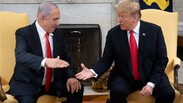
The Islamic Action Front has called on the Jordanian government not to participate in a US-led conference in Bahrain next month in support of US President Donald Trump’s controversial proposal for “peace” between the Israeli regime and Palestinians, dubbed “the deal of the century.”
The political party, which is the political wing of the Muslim Brotherhood in Jordan, said in a statement on Tuesday that the forthcoming conference falls within the framework of the so-called deal of the century that is aimed at liquidating the Palestinian cause.
“Jordan’s official and popular position is to refuse any deal, which would undermine the rights of the Palestinian nation and interests of the Jordanian state,” the statement pointed out.
The US will host the economic conference on June 25 and 26 to purportedly encourage investment in the West Bank and the Gaza Strip.
Mounir Rashid, a member of the Islamic Action Front, said the meeting represents a dangerous attempt to suffocate the Palestinian cause, and is in line with Trump administration’s transfer of the American embassy from Tel Aviv to Jerusalem al-Quds, bids to abolish the right of return, and recognition of the annexation of the occupied Golan Heights as well settlements built on private Palestinian lands.
“American administrations have time and time again violated international laws and obligations on the Palestinian issue to demonstrate their bias towards the Zionist regime (of Israel). The Bahrain conference is the last chapter before Arabs’ formal normalization of ties with Israel… The will of a nation is an impenetrable barrier to such plots.
The Palestinian nation will not give up their land, sanctities, right of return and ultimate freedom,” Rashid highlighted.
Meanwhile, Palestinian Freedom Movement has described the American-led conference in Bahrain as a serious attack on the Palestinian issue, calling on the Manama regime to reverse the “dangerous decision.”
It also urged the Bahraini nation as well as the country’s institutions and executive bodies to act effectively and pressure officials to overturn the decision.
On Monday, the Palestinian resistance movement, Hamas, called on Arab countries not to accept invitations to participate in the upcoming Bahrain workshop scheduled for late June, saying, “This is the beginning of the deal of the century.”
“We call on Arab countries not to respond to invitations to participate in the workshop in Bahrain, and stand by the Palestinian nation by all means and tools..,” the movement said in a statement.
Trump’s “peace plan” has already been dismissed by Palestinian authorities ahead of its unveiling at the end of the holy fasting month of Ramadan and the formation of the new Israeli cabinet, most likely in June.
Speaking in the occupied West Bank city of Ramallah on April 16, Palestinian Prime Minister Mohammad Shtayyeh lashed out at the initiative, asserting that it was “born dead.”
Shtayyeh noted that negotiations with the US were useless in the wake of the country’s relocation of its embassy from Tel Aviv to Jerusalem al-Quds, which Palestinians consider the capital city of their future state.
The political party, which is the political wing of the Muslim Brotherhood in Jordan, said in a statement on Tuesday that the forthcoming conference falls within the framework of the so-called deal of the century that is aimed at liquidating the Palestinian cause.
“Jordan’s official and popular position is to refuse any deal, which would undermine the rights of the Palestinian nation and interests of the Jordanian state,” the statement pointed out.
The US will host the economic conference on June 25 and 26 to purportedly encourage investment in the West Bank and the Gaza Strip.
Mounir Rashid, a member of the Islamic Action Front, said the meeting represents a dangerous attempt to suffocate the Palestinian cause, and is in line with Trump administration’s transfer of the American embassy from Tel Aviv to Jerusalem al-Quds, bids to abolish the right of return, and recognition of the annexation of the occupied Golan Heights as well settlements built on private Palestinian lands.
“American administrations have time and time again violated international laws and obligations on the Palestinian issue to demonstrate their bias towards the Zionist regime (of Israel). The Bahrain conference is the last chapter before Arabs’ formal normalization of ties with Israel… The will of a nation is an impenetrable barrier to such plots.
The Palestinian nation will not give up their land, sanctities, right of return and ultimate freedom,” Rashid highlighted.
Meanwhile, Palestinian Freedom Movement has described the American-led conference in Bahrain as a serious attack on the Palestinian issue, calling on the Manama regime to reverse the “dangerous decision.”
It also urged the Bahraini nation as well as the country’s institutions and executive bodies to act effectively and pressure officials to overturn the decision.
On Monday, the Palestinian resistance movement, Hamas, called on Arab countries not to accept invitations to participate in the upcoming Bahrain workshop scheduled for late June, saying, “This is the beginning of the deal of the century.”
“We call on Arab countries not to respond to invitations to participate in the workshop in Bahrain, and stand by the Palestinian nation by all means and tools..,” the movement said in a statement.
Trump’s “peace plan” has already been dismissed by Palestinian authorities ahead of its unveiling at the end of the holy fasting month of Ramadan and the formation of the new Israeli cabinet, most likely in June.
Speaking in the occupied West Bank city of Ramallah on April 16, Palestinian Prime Minister Mohammad Shtayyeh lashed out at the initiative, asserting that it was “born dead.”
Shtayyeh noted that negotiations with the US were useless in the wake of the country’s relocation of its embassy from Tel Aviv to Jerusalem al-Quds, which Palestinians consider the capital city of their future state.

The Hamas Movement has called on Arab countries not to accept invitations to attend the economic workshop slated for next June in Bahrain, warning the events is intended to launch US president Donald Trump’s deal of the century.
In a press release on Monday, Hamas called on Arab countries to boycott the intended conference in Bahrain and provide the Palestinian people with every support to confront and frustrate the US deal of the century.
“We are following with great concern the American announcement about holding an economic workshop next June in the Bahraini capital of Manama,” Hamas said, describing it as the first American conference to be held as part of the deal of the century.
The Movement warned of any Arab involvement in adopting and executing the deal of the century, saying any participation in the US workshop would be considered a violation of the Arab and Palestinian position and departure from the Arab and Islamic constants.
It expressed its rejection of any political or economic steps paving the way to implementing the deal of the century.
In a press release on Monday, Hamas called on Arab countries to boycott the intended conference in Bahrain and provide the Palestinian people with every support to confront and frustrate the US deal of the century.
“We are following with great concern the American announcement about holding an economic workshop next June in the Bahraini capital of Manama,” Hamas said, describing it as the first American conference to be held as part of the deal of the century.
The Movement warned of any Arab involvement in adopting and executing the deal of the century, saying any participation in the US workshop would be considered a violation of the Arab and Palestinian position and departure from the Arab and Islamic constants.
It expressed its rejection of any political or economic steps paving the way to implementing the deal of the century.
15 may 2019
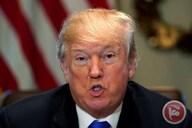
United States President Donald Trump denied a New York Times report that US officials were discussing a military plan to send up to 120,000 troops to the Middle East to counter any attacks or nuclear weapons acceleration by Iran, on Tuesday.
According to the Reuters news outlet, Trump told reporters at the White House, in Washington D.C., “I think it’s fake news, OK? Now, would I do that? Absolutely. But we have not planned for that.”
He added, “Hopefully, we’re not going to have to plan for that and if we did that, we’d send a hell of a lot more troops than that.”
The New York Times news outlet reported that US Acting Defense Secretary, Patrick Shanahan, presented an updated plan last week that envisioned sending up to 120,000 US troops to the region if Iran carries out attacks against US forces or nuclear weapons acceleration.
However, sources also reported that the updated plan does not call for a land invasion of Iran, which would require much more troops.
According to the Reuters news outlet, Trump told reporters at the White House, in Washington D.C., “I think it’s fake news, OK? Now, would I do that? Absolutely. But we have not planned for that.”
He added, “Hopefully, we’re not going to have to plan for that and if we did that, we’d send a hell of a lot more troops than that.”
The New York Times news outlet reported that US Acting Defense Secretary, Patrick Shanahan, presented an updated plan last week that envisioned sending up to 120,000 US troops to the region if Iran carries out attacks against US forces or nuclear weapons acceleration.
However, sources also reported that the updated plan does not call for a land invasion of Iran, which would require much more troops.
14 may 2019

One of the top leaders in the Palestinian government, Dr. Hanan Ashrawi, has had her visa rejected by the U.S. government with no reason given for the denial.
Ashrawi has long been considered a moderate, tempered voice among the Palestinian leadership who is seen as both uncorruptible and steadfast in her support for Palestinian basic rights.
In February of this year, in response to the death of an ill Palestinian prisoner in Israeli prison, Ashrawi stated, “Israel is a serial violator of human rights and its obligations under international humanitarian law, including the systematic use of torture and other inhumane treatment as well as medical negligence.
It is high time for Israel’s brutality against Palestinian prisoners, illegally imprisoned inside Israeli territory, to be thoroughly and independently investigated.”
In response to the rejection of her visa, Ashrawi released a series of tweets that read as follows: tweet1 tweet2 tweet3 tweet4 tweet5 tweet6 tweet7 (read below)
The rejection of Ashrawi’s visa comes a month after the U.S. State Department decided to deny a visa to Omar Barghouthi, known as a leader within the Palestinian campaign known as ‘Boycott-Divest-Sanctions (BDS) urging international pressure on Israel to get that country’s government to adhere to international law and respect the rights of Palestinians.
Although the U.S. State Department has said that it does not deny visas based solely on political views, critics say that it is clear that those are indeed the grounds for these visa denials. Both Barghouthi and Ashrawi have traveled to the U.S. many times before. Ashrawi spent several years as a doctoral student earning her PhD in the U.S., and has children and grandchildren who are U.S. citizens living in the U.S.
Both Barghouthi and Ashrawi received numerous visas to travel and speak in the U.S., through both Republican and Democratic administrations, and have never had visa applications rejected until the current Trump administration. Since nothing has changed in the situation of either one, international analysts say that it is clear that these rejections are based on political beliefs.
According to the Israeli newspaper Ha’aretz, a State Department official told their reporter, “Visa records are confidential under U.S. law; therefore, we cannot discuss the details of individual visa cases”, but added that U.S. law “does not authorize the refusal of visas based solely on political statements or views if those statements or views would be lawful in the United States.”
Ashrawi had a back-and-forth on Twitter with Jason Greenblatt, Donald Trump’s advisor on Israel. In response to a tweet by Ashrawi in February criticizing U.S. policy toward the Palestinian people, Greenblatt responded on Twitter that Ashrawi would be welcome to come and talk to him at the White House.
But now, Ashrawi will not be allowed that chance, due to the U.S. State Department denying her visa with no reason provided.
Greenblatt spoke several days ago at the United Nations, rejecting calls for Palestinian equal rights and instead saying that the ‘peace plan’ that he and Jared Kushner have been drafting in secret will be rolled out within the next two weeks.
He stated that Israel’s security was of the utmost importance to the U.S., did not mention anything about Palestinians having rights, and stated that “I’m not a believer in boycotts but in engagement” – a reference to the worldwide movement to boycott Israeli products and businesses to try to pressure Israel to adhere to international law and the Fourth Geneva Convention.
Setting foreign policy via social media has never been a practice of the U.S. or any government prior to the current U.S. administration, but it has become commonplace in the Trump administration, as Donald Trump and his advisors continually roll out new, often contradictory, policies via Twitter on a nearly daily basis.
Ashrawi has long been considered a moderate, tempered voice among the Palestinian leadership who is seen as both uncorruptible and steadfast in her support for Palestinian basic rights.
In February of this year, in response to the death of an ill Palestinian prisoner in Israeli prison, Ashrawi stated, “Israel is a serial violator of human rights and its obligations under international humanitarian law, including the systematic use of torture and other inhumane treatment as well as medical negligence.
It is high time for Israel’s brutality against Palestinian prisoners, illegally imprisoned inside Israeli territory, to be thoroughly and independently investigated.”
In response to the rejection of her visa, Ashrawi released a series of tweets that read as follows: tweet1 tweet2 tweet3 tweet4 tweet5 tweet6 tweet7 (read below)
The rejection of Ashrawi’s visa comes a month after the U.S. State Department decided to deny a visa to Omar Barghouthi, known as a leader within the Palestinian campaign known as ‘Boycott-Divest-Sanctions (BDS) urging international pressure on Israel to get that country’s government to adhere to international law and respect the rights of Palestinians.
Although the U.S. State Department has said that it does not deny visas based solely on political views, critics say that it is clear that those are indeed the grounds for these visa denials. Both Barghouthi and Ashrawi have traveled to the U.S. many times before. Ashrawi spent several years as a doctoral student earning her PhD in the U.S., and has children and grandchildren who are U.S. citizens living in the U.S.
Both Barghouthi and Ashrawi received numerous visas to travel and speak in the U.S., through both Republican and Democratic administrations, and have never had visa applications rejected until the current Trump administration. Since nothing has changed in the situation of either one, international analysts say that it is clear that these rejections are based on political beliefs.
According to the Israeli newspaper Ha’aretz, a State Department official told their reporter, “Visa records are confidential under U.S. law; therefore, we cannot discuss the details of individual visa cases”, but added that U.S. law “does not authorize the refusal of visas based solely on political statements or views if those statements or views would be lawful in the United States.”
Ashrawi had a back-and-forth on Twitter with Jason Greenblatt, Donald Trump’s advisor on Israel. In response to a tweet by Ashrawi in February criticizing U.S. policy toward the Palestinian people, Greenblatt responded on Twitter that Ashrawi would be welcome to come and talk to him at the White House.
But now, Ashrawi will not be allowed that chance, due to the U.S. State Department denying her visa with no reason provided.
Greenblatt spoke several days ago at the United Nations, rejecting calls for Palestinian equal rights and instead saying that the ‘peace plan’ that he and Jared Kushner have been drafting in secret will be rolled out within the next two weeks.
He stated that Israel’s security was of the utmost importance to the U.S., did not mention anything about Palestinians having rights, and stated that “I’m not a believer in boycotts but in engagement” – a reference to the worldwide movement to boycott Israeli products and businesses to try to pressure Israel to adhere to international law and the Fourth Geneva Convention.
Setting foreign policy via social media has never been a practice of the U.S. or any government prior to the current U.S. administration, but it has become commonplace in the Trump administration, as Donald Trump and his advisors continually roll out new, often contradictory, policies via Twitter on a nearly daily basis.
|
1 /It is official! My US visa application has been rejected. No reason given. Choose any of the following: I’m over 70 & a grandmother; I’ve been an activist for Palestine since the late 1960’s; I’ve always been an ardent supporter of nonviolent resistance;
|
2 /I’ve always struggled for human rights and against corruption; I’m basically an academic although I was elected to the PLC & PNC & the PLO Executive Committee; I studied for my Ph.D. in the US; I’ve been a frequent visitor there since then;
|
3 /I’ve met (& even negotiated with) every Sec. of State since Shultz, & every President since George H. W. Bush (present administration excluded); I’ve been a vocal critic of this administration & its underlings; I believe in freedom of speech; I’ve always been searingly honest;
|
4 /I despise hypocrisy, misogyny, absolutist fundamentalism, populism, racism of all kinds, exclusivity, arrogance & condescension, power politics & militarism, cruelty in any form, & any sense of entitlement & exceptionalism;
|
|
5 /Most of all, I have no tolerance for the Israeli occupation in all its manifestations as a most pervasive form of oppression, dispossession & denial; I have no respect for the enablers of this inhuman condition nor for its apologists;
|
6 /I have a tremendous sense of love & protectiveness for the people of Palestine wherever they may be & am constantly humbled by their resilience & persistence in spite of all their pain; I also identify & stand in solidarity with all those who are suffering any injustice.
|
7 /I’m guilty of all of the above, & as such this administration has decided I do not deserve to set foot in the US. I just hope someone can explain this to my grandchildren & all the rest of my family there.
|
13 may 2019
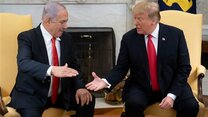
US President Donald Trump’s controversial “deal of the century” is expected to include recognition of Israeli law extending to all settlements in the occupied West Bank, Israel’s Chanel 12 News says.
Trump’s so-called peace plan will provide for all illegal Israeli settlements to “remain in Israeli hands under a permanent accord” and “the Americans will not oppose Israeli steps relating to the settlements,” it said.
The report said while the US will not explicitly back the formal “extension of Israeli sovereignty” to the settlements or their annexation, it will not object to the “extension of Israeli law” to the settlements.
In the run-up to last month’s elections, Israeli Prime Minister Benjamin Netanyahu promised to extend "sovereignty" to West Bank settlements and hoped he would be able to do so with American support.
Chanel 12 News said if Tel Aviv extends Israeli law to all the settlements, the US “won’t oppose, or will be okay with, or won’t make a fuss about” such a move.
The White House has declined to comment on the matter.
Trump’s so-called peace plan has been dismissed by Palestinian authorities ahead of its unveiling at the end of the holy fasting month of Ramadan and the formation of the new Israeli cabinet, most likely in June.
Speaking in the occupied West Bank city of Ramallah last month, Palestinian Prime Minister Mohammad Shtayyeh lashed out at Trump’s initiative, asserting that it was “born dead.”
Shtayyeh noted that negotiations with the US were useless in the wake of the country’s relocation of its embassy from Tel Aviv to Jerusalem al-Quds, which Palestinians consider the capital of their future state.
Israel occupied the West Bank as well as East Jerusalem al-Quds during the Six-Day War in 1967. It later annexed the Palestinian city in a move not recognized by the international community.
About 600,000 Israelis live in over 230 illegal settlements built since the 1967 Israeli occupation of the Palestinian territories of the West Bank and East Jerusalem al-Quds.
Palestinians want the West Bank as part of a future independent Palestinian state with East Jerusalem al-Quds as its capital.
In a highly provocative move on March 25, the US president signed a proclamation recognizing Israel's "sovereignty" over Syria's Golan Heights.
Last year, Trump recognized Jerusalem al-Quds as the so-called capital of the Israeli regime. The US later relocated its embassy from Tel Aviv to the city.
Trump’s so-called peace plan will provide for all illegal Israeli settlements to “remain in Israeli hands under a permanent accord” and “the Americans will not oppose Israeli steps relating to the settlements,” it said.
The report said while the US will not explicitly back the formal “extension of Israeli sovereignty” to the settlements or their annexation, it will not object to the “extension of Israeli law” to the settlements.
In the run-up to last month’s elections, Israeli Prime Minister Benjamin Netanyahu promised to extend "sovereignty" to West Bank settlements and hoped he would be able to do so with American support.
Chanel 12 News said if Tel Aviv extends Israeli law to all the settlements, the US “won’t oppose, or will be okay with, or won’t make a fuss about” such a move.
The White House has declined to comment on the matter.
Trump’s so-called peace plan has been dismissed by Palestinian authorities ahead of its unveiling at the end of the holy fasting month of Ramadan and the formation of the new Israeli cabinet, most likely in June.
Speaking in the occupied West Bank city of Ramallah last month, Palestinian Prime Minister Mohammad Shtayyeh lashed out at Trump’s initiative, asserting that it was “born dead.”
Shtayyeh noted that negotiations with the US were useless in the wake of the country’s relocation of its embassy from Tel Aviv to Jerusalem al-Quds, which Palestinians consider the capital of their future state.
Israel occupied the West Bank as well as East Jerusalem al-Quds during the Six-Day War in 1967. It later annexed the Palestinian city in a move not recognized by the international community.
About 600,000 Israelis live in over 230 illegal settlements built since the 1967 Israeli occupation of the Palestinian territories of the West Bank and East Jerusalem al-Quds.
Palestinians want the West Bank as part of a future independent Palestinian state with East Jerusalem al-Quds as its capital.
In a highly provocative move on March 25, the US president signed a proclamation recognizing Israel's "sovereignty" over Syria's Golan Heights.
Last year, Trump recognized Jerusalem al-Quds as the so-called capital of the Israeli regime. The US later relocated its embassy from Tel Aviv to the city.
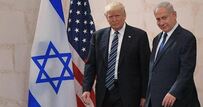
Israel's Prime Minister Benjamin Netanyahu on Sunday announced that a site for a new settlement to be named after the US president Donald Trump in the occupied Golan Heights has been chosen.
"I would like to inform you that we have already selected a site in the Golan Heights where this new community will be established, and we have started the process," Netanyahu said via Twitter.
In April Netanyahu revealed his intention to name a new settlement in Golan after Trump to thank him for recognizing Israel's claim of sovereignty over the Syrian heights.
In March, at the White House, in the presence of Netanyahu, Trump signed a decree under which he recognized Israel's sovereignty over the Syrian territory, a move that sparked widespread international condemnation.
Israel occupied two thirds of Golan Heights during the 1967 war and announced its annexation in 1981, which was rejected by the international community and the United Nations Security Council through Resolution 497.
In an attempt to entrench the annexation move, the Israeli government in April 2018 held its first official meeting in the Syrian Golan since its occupation in 1967.
"I would like to inform you that we have already selected a site in the Golan Heights where this new community will be established, and we have started the process," Netanyahu said via Twitter.
In April Netanyahu revealed his intention to name a new settlement in Golan after Trump to thank him for recognizing Israel's claim of sovereignty over the Syrian heights.
In March, at the White House, in the presence of Netanyahu, Trump signed a decree under which he recognized Israel's sovereignty over the Syrian territory, a move that sparked widespread international condemnation.
Israel occupied two thirds of Golan Heights during the 1967 war and announced its annexation in 1981, which was rejected by the international community and the United Nations Security Council through Resolution 497.
In an attempt to entrench the annexation move, the Israeli government in April 2018 held its first official meeting in the Syrian Golan since its occupation in 1967.
12 may 2019
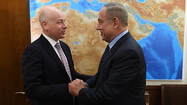
US Special Mideast Envoy Jason D. Greenblatt and Prime Minister Netanyahu
Jason D. Greenblat says the Trump administration's long-delayed proposal will not be unveiled after the holy month of Ramadan as was reported earlier but rather after the Jewish holiday of Shavuot on June 10
US Special Mideast Envoy Jason D. Greenblatt said Saturday the Trump administration’s long-delayed peace proposal, dubbed “the deal of the century” will not be unveiled until mid-June after the Jewish holiday of Shavuot.
Last month, reports suggested White House senior adviser Jared Kushner - the plan’s architect - planned to unveil the proposal after Israel forms a governing coalition in the wake of Prime Minister Benjamin Netanyahu's election victory and after the Muslim holy month of Ramadan, which ends in early June.
“One thing we won’t do, the Trump administration won’t compromise on Israel’s security,” he said in an interview with Fox News.
Greenblatt also spoke Thursday at a UN meeting meant to condemn Israeli military’s action during the latest round of cross-border fighting in Gaza, which left four Israeli civilians dead.
The meeting - during which Palestinian foreign minister also gave a speech - was held on Israel’s 71st Independence Day, making it deliberately antagonistic, according to Greenblatt.
“I’m not a believer in boycotts but in engagement … It’s outrageous to hold a meeting like this without addressing the attacks on Israel. This from a body who would not condemn Hamas several months ago,” Greenblatt said in the interview.
Greenblat also lamented the Palestinian Authority's dismissive attitude toward the peace plan, saying the rejection of the proposal only harms the ordinary citizens. “It’s terribly frustrating for ordinary Palestinians," he said. "I meet with them frequently, and this is the message they tell me. They understand they may not like aspects of the plan but are upset that their leaders are saying they won’t even take a look at it. I feel terrible for the Palestinian people.”
The 53-year-old emphasized the plan encompasses "all the core issues" and includes both political and economic proposals. "It’s both political and economic plan," he said. "Once everyone has read and given their thoughts on it, there is still a long way to go before a final signing agreement, and that will be up to the parties themselves to negotiate.”
Jason D. Greenblat says the Trump administration's long-delayed proposal will not be unveiled after the holy month of Ramadan as was reported earlier but rather after the Jewish holiday of Shavuot on June 10
US Special Mideast Envoy Jason D. Greenblatt said Saturday the Trump administration’s long-delayed peace proposal, dubbed “the deal of the century” will not be unveiled until mid-June after the Jewish holiday of Shavuot.
Last month, reports suggested White House senior adviser Jared Kushner - the plan’s architect - planned to unveil the proposal after Israel forms a governing coalition in the wake of Prime Minister Benjamin Netanyahu's election victory and after the Muslim holy month of Ramadan, which ends in early June.
“One thing we won’t do, the Trump administration won’t compromise on Israel’s security,” he said in an interview with Fox News.
Greenblatt also spoke Thursday at a UN meeting meant to condemn Israeli military’s action during the latest round of cross-border fighting in Gaza, which left four Israeli civilians dead.
The meeting - during which Palestinian foreign minister also gave a speech - was held on Israel’s 71st Independence Day, making it deliberately antagonistic, according to Greenblatt.
“I’m not a believer in boycotts but in engagement … It’s outrageous to hold a meeting like this without addressing the attacks on Israel. This from a body who would not condemn Hamas several months ago,” Greenblatt said in the interview.
Greenblat also lamented the Palestinian Authority's dismissive attitude toward the peace plan, saying the rejection of the proposal only harms the ordinary citizens. “It’s terribly frustrating for ordinary Palestinians," he said. "I meet with them frequently, and this is the message they tell me. They understand they may not like aspects of the plan but are upset that their leaders are saying they won’t even take a look at it. I feel terrible for the Palestinian people.”
The 53-year-old emphasized the plan encompasses "all the core issues" and includes both political and economic proposals. "It’s both political and economic plan," he said. "Once everyone has read and given their thoughts on it, there is still a long way to go before a final signing agreement, and that will be up to the parties themselves to negotiate.”
